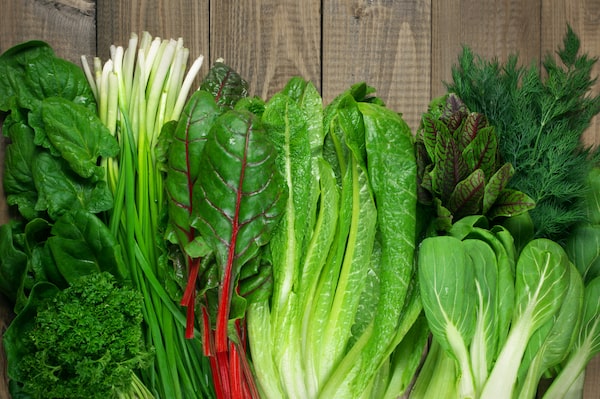
Nitrate-rich leafy greens may help preserve muscle function and strength, according to the findings of a new study.Svetlana Lukienko/iStockPhoto / Getty Images
Sign up for the weekly Health & Wellness newsletter for the latest news and advice.
There are many reasons to eat plenty of vegetables each day. Protection against high blood pressure, heart disease, stroke, macular degeneration and cognitive decline are among them.
Now, new study findings suggest another important reason – to preserve muscle strength and muscle function as you age.
Entering middle age with better muscle strength is thought to protect against disability and frailty later in life. In older adults, declines in strength increase the risk of falls, a major cause of bone fractures.
When it comes to supporting muscle function, though, not all vegetables will do the trick. According to the Australian research team, veggies packed with compounds called nitrates – e.g., leafy greens, beets – are the ones that have muscle benefits.
About the study
Previous studies have shown that taking nitrate supplements improves muscle function during an exercise test. It’s not known, though, whether a regular intake of nitrates from diet affects muscle strength and function.
The study, published online in The Journal of Nutrition on March 24, investigated the link between dietary nitrate intake and muscle function in 3,759 healthy adults who were participating in a large continuing Australian health and lifestyle study.
Participants, age 48 on average at the start of the study, were followed for 12 years, during which time dietary intake was measured at least twice. Vegetables contributed the majority (81 per cent) of daily nitrate intake.
Muscle function was measured using knee-extension strength and the 2.4-metre-TUG (Timed-Up-And-Go) test.
For the TUG test, participants were asked to rise from a seated position, walk 2.4 metres, turn, walk back and sit down again. A shorter time to complete the test indicated better speed and mobility during different tasks (e.g., sitting, standing, walking, turning).
Compared to participants with the lowest nitrate intake, those who consumed the most had significantly better knee-extension strength and faster TUG performance.
The researchers accounted for other factors that could influence muscle strength such as age, sex, body-mass index, physical activity and smoking status.
Since physical activity improves muscle strength, the researchers also looked at whether the relationship between nitrate intake and muscle function was influenced by a person’s level of daily physical activity.
Total physical activity did not alter the association between nitrate intake and muscle strength, suggesting that dietary nitrates have an independent effect on muscle function.
Caveats
This study was observational and, therefore, does not prove that eating nitrate-rich vegetables improves muscle strength.
As well, only the duration of physical activity, not the type, was measured. Since different types of exercise (e.g., walking versus resistance training) vary in their effectiveness for improving muscle function, the effect of nitrates may depend on the type of exercise performed.
Even so, these findings align with past research linking higher dietary nitrate intake to better muscle strength and function in older women.
Nitrates, vegetables and muscle strength
According to Stuart Phillips, a professor in kinesiology at McMaster University and a Tier 1 Canada Research Chair in Skeletal Muscle Health and Aging, “there are plausible reasons why nitrates may benefit muscle function.”
Nitrates improve mitochondrial function, the power plant inside every cell, which could allow for better muscle strength. Nitrates are also converted to nitric oxide, a chemical that relaxes blood vessels, lowers blood pressure and improves circulation. Eating nitrate-rich vegetables could possibly increase the flow of oxygen to working muscles.
Vegetables that deliver the most nitrates include leafy greens (spinach, arugula, lettuce, kale, Swiss chard, collard greens), bok choy, celery, radish and carrots.
In the study, the greatest benefits to muscle function occurred at a daily nitrate intake of 90 mg, an amount that’s easily achieved by eating one cup of leafy green vegetables each day.
While these new findings suggest that certain vegetables play a role in supporting muscle health, it’s well established that resistance training plays a crucial role.
Says Phillips, “In my estimation, nothing tops physical activity for maintaining strength. That said, these are interesting data and certainly indicate another potential upside of eating your vegetables. It can’t hurt and can likely only help.”
Leslie Beck, a Toronto-based private practice dietitian, is director of food and nutrition at Medcan. Follow her on Twitter @LeslieBeckRD